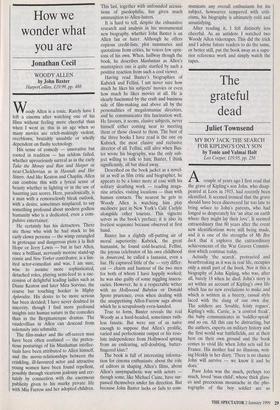How we wonder what you are
Jonathan Cecil
WOODY ALLEN by John Baxter HarperCollins, £19.99, pp. 488 Woody Allen is a tonic. Rarely have I left a cinema after watching one of his films without feeling more cheerful than when I went in: this in an age when so many movies are retch-makingly violent, overblown, brutishly unsubtle or wholly dependent on flashy technology. His sense of comedy — innovative but rooted in tradition — has seldom failed, whether uproariously surreal as in the early Take the Money and Run and Sleeper or near-Chekhovian as in Hannah and Her Sisters. And like Keaton and Chaplin, Allen can combine this with a lyrical sense of beauty whether in lighting or in the use of haunting jazz scores. Here, paradoxically, is a man with a remorselessly bleak outlook, with a desire, sometimes misplaced, to say something profound about modern godless humanity who is a dedicated, even a com- pulsive entertainer.
He certainly has his detractors. There are those who wish he had stuck to his early clown persona — the wimp entangled in grotesque and dangerous plots a la Bob Hope or Jerry Lewis — but in fact Allen, once a brilliant, nervously morose stand-up comic and New Yorker contributor, is a lim- ited actor-comedian and was, I am sure, wise to assume more sophisticated, detached roles, playing semi-feed to a suc- cession of delightful leading ladies such as Diane Keaton and later Mira Sorvino, the coarse but touching hooker in Mighty Aphrodite. His desire to be more serious has been derided; I have never doubted its sincerity, though I find more profound insights into human nature in the comedies than in the Bergmanesque dramas. The vaudevillian in Allen can descend from solemnity into schmaltz. The film-maker and the off-screen man have been often confused — the preten- tious posturings of his Manhattan intellec- tuals have been attributed to Allen himself, and the movie-relationships between the crinkling, ill-favoured actor and attractive young women have been found repellent, possibly through vicarious jealousy and cer- tainly by connection with the enormous publicity given to his murky private life with Mia Farrow and her adopted children. This last, together with unfounded accusa- tions of paedophilia, has given much ammunition to Allen-haters.
It is hard to tell, despite the exhaustive research and analysis in his monumental new biography, whether John Baxter is an Allen fan or hater. Although he offers copious credit-lists, plot summaries and quotations from critics, he voices few opin- ions of his own. When, halfway though the book, he describes Manhattan as Allen's masterpiece one is quite startled by such a positive reaction from such a cool viewer, Having read Baxter's biographies of Kubrick and Fellini, I am never sure how much he likes his subjects' movies or even how much he likes movies at all. He is clearly fascinated by the craft and business side of film-making and above all by the personalities of megalomaniac directors, and he communicates this fascination well.
He favours, it seems, elusive subjects, never himself either coming near to meeting them or those closest to them. The best of the three books I have read is the one on Kubrick, the most elusive and reclusive director of all. Fellini, still alive when Bax- ter wrote his biography, was the only sub- ject willing to talk to him; Baxter, I think significantly, all but shied away.
Described on the book jacket as a novel- ist as well as film critic and biographer, he appears to be a loner more at ease with his solitary sleuthing work — reading maga- zine articles, visiting locations — than with human contacts. The nearest he gets to Woody Allen is watching him play mediocre' jazz in New York's Café Carlyle alongside other tourists. This vignette serves as the book's preface; it is also its liveliest sequence because observed at first hand.
Baxter has a slightly off-putting air of moral superiority: Kubrick, the great humanist, he found cold-hearted, Fellini, the joyous celebrator of his own childhood in Amarcord, he called a fantasist, even a liar. He captured little of the — very differ- ent — charm and humour of the two men for both of whom I have happily worked; he was also guilty of some niggling inaccu- racies. However, he is a respectable writer with no Hollywood Babylon or Donald Spoto prurience, even when dealing with the unappetising Allen-Farrow saga about which he is scrupulously even-handed.
True to form, Baxter reveals the real Woody as a hard-headed, sometimes ruth- less fanatic. But were any of us naive enough to suppose that Allen's prolific, varied and perfectionist output or his reso- lute independence from Hollywood sprang from an endearing, self-doubting, butter- fingered klutz?
The book is full of interesting informa- tion for cinema enthusiasts: about the role of editors in shaping Allen's films, about Allen's unsympathetic way with actors though some, like Michael Caine, have sur- passed themselves under his direction. But because John Baxter lacks or fails to com- municate any overall enthusiasm for his subject, howsoever tempered with criti- cisms, his biography is ultimately cold and unsatisfying.
After reading it, I felt distinctly less cheerful. As an antidote I watched two Woody Allen videotapes. This did the trick and I advise future readers to do the same, or better still, put the book away as a supe- rior reference work and simply watch the tapes.


























































 Previous page
Previous page